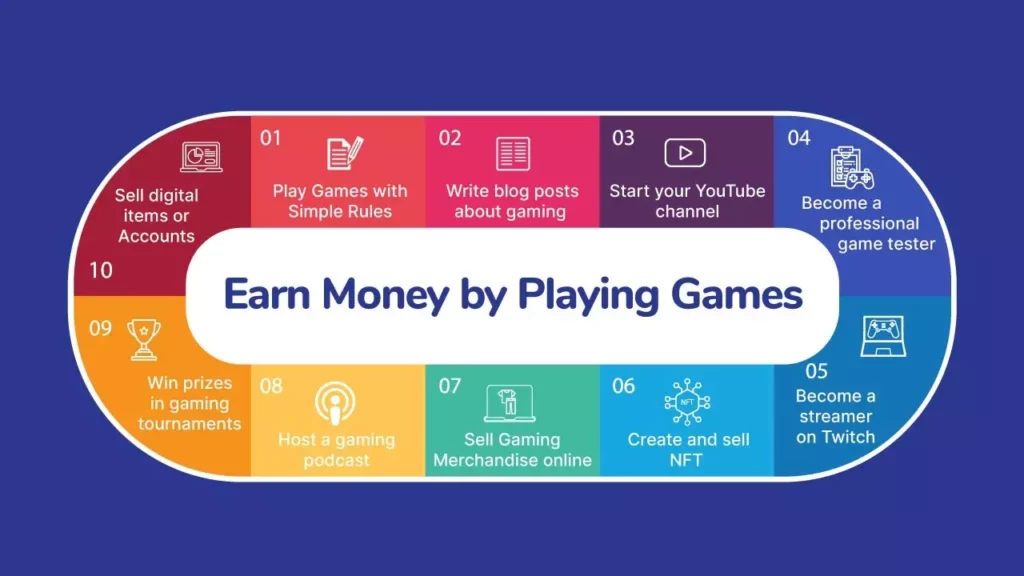How Rewarded Gaming Portals Are Helping Gamers Turn Play into Profit
How Rewarded Gaming Portals Are Helping Gamers Turn Play into Profit
Blog Article
Just How Play-to-Earn Games Are Transforming the Video Gaming Industry

Comprehending Play-to-Earn Mechanics
The play-to-earn design has actually become an innovative idea within the video gaming market, basically modifying the partnership in between players and the video games they engage with. This version makes it possible for players to earn concrete rewards, commonly in the form of cryptocurrencies or non-fungible symbols (NFTs), via their in-game tasks. Unlike typical pc gaming structures that generally monetize through subscription fees or single acquisitions, play-to-earn games incentivize gamer participation by directly connecting gameplay success to real-world value.
At the core of play-to-earn auto mechanics is the integration of blockchain modern technology, which makes sure transparency and provable ownership of in-game properties. Gamers can purchase, market, or trade these properties in decentralized marketplaces, equipping them with economic firm previously undetected in standard pc gaming atmospheres. Each player's payment to the video game community-- be it through experienced play, strategic trading, or area participation-- enhances the general pc gaming experience while offering them an opportunity to create income.
As gamers spend time and resources, they not just deepen their engagement with the video game yet additionally foster a dynamic economy that mirrors their cumulative efforts (play and earn rewards). This makeover of gameplay into a monetizable endeavor is reshaping both gamer inspiration and video game layout
Financial Effect On Players

In addition, play-to-earn designs democratize accessibility to economic benefits. Gamers from varying socio-economic backgrounds can get involved and potentially gain considerable income, linking voids that exist in standard job markets. This standard shift cultivates monetary independence, specifically in regions where job opportunity may be restricted.
In addition, the intro of online economic situations permits players to construct wealth with strategic investments in in-game properties, which can appreciate with time. This has caused the introduction of a new class of players who come close to play-to-earn as a significant income-generating activity, usually causing the reinvestment of profits into the video gaming ecological community itself. Ultimately, the financial effect on players is extensive, as they navigate a landscape where leisure and income merge.
The Function of Blockchain Technology
What makes blockchain innovation a keystone of play-to-earn games is its capacity to provide decentralization, openness, and safety. By using a dispersed journal system, blockchain makes certain that all transactions within the video game are tape-recorded in an immutable way, permitting gamers to confirm ownership of in-game properties without relying on a central authority. This transparency cultivates trust amongst players, as they can independently validate the shortage and provenance of electronic items, boosting their worth.
Additionally, blockchain innovation equips gamers with decentralization, enabling them to participate in peer-to-peer purchases. Gamers are no more constrained to in-game economic situations controlled by designers; rather, they can trade, offer, or rent their assets openly in open industries. This change not just boosts the general liquidity of digital assets but additionally urges even more purposeful player interaction, as users can directly profit from their effort and time spent in the video game.
Furthermore, blockchain helps with the creation of wise contracts, which automate different in-game processes, from incentives circulation to governance systems. play and earn rewards. This advancement lowers the risk of fraud and ensures fair game, additional solidifying blockchain's integral duty in the advancement of play-to-earn video gaming
Challenges and Objections
Regularly, play-to-earn games face considerable challenges and objections that can prevent their growth and acceptance within the wider gaming neighborhood. One key concern is the possibility for a speculative bubble, where the worth of in-game assets can rise and fall dramatically, resulting in economic losses for players. This volatility undermines the stability that conventional pc gaming atmospheres normally supply.
In addition, the combination of blockchain technology typically increases inquiries regarding environmental sustainability. The power consumption connected with particular blockchain networks has actually triggered arguments regarding the environmental effect of these video games. Critics argue that the carbon impact generated by play-to-earn platforms might hinder eco-conscious players.
Furthermore, there are problems regarding access and inclusivity. Many play-to-earn games require players to invest considerable in advance capital to acquire required possessions, creating barriers for those with restricted financial resources. This design can unintentionally create a divide between wealthier players and those that can not afford to participate.
Future Trends in Video Gaming
As the gaming industry remains to evolve, numerous future patterns are emerging that pledge to reshape the landscape of play-to-earn games and beyond. One substantial trend is the increasing integration of blockchain innovation, which enhances openness and safety in deals. This will likely cause greater count on amongst players, encouraging bigger adoption of play-to-earn models.
In addition, the surge of non-fungible tokens (NFTs) is established to change digital possession, permitting gamers to absolutely have in-game possessions. This shift will certainly not just encourage gamers yet likewise create brand-new financial opportunities within the digital environment. The convergence of video gaming with various other sectors, such as social media and decentralized money (DeFi), is anticipated to promote ingenious gameplay technicians and money Gaming platform with rewards making strategies.
Additionally, developments in expert system and equipment knowing will certainly enable a lot more personalized pc gaming experiences, dealing with specific player preferences and boosting engagement. The growing emphasis on community-driven advancement will likely affect video game style, as gamers increasingly take part in forming their pc gaming settings. Jointly, these patterns indicate a transformative future for the video gaming market, where play-to-earn versions will certainly play a main role in redefining gamer interaction and worth production.
Conclusion
To conclude, play-to-earn video games stand for a substantial shift in the video gaming market, promoting financial chances with ingenious mechanics that leverage blockchain innovation. This design not only equalizes access to monetary benefits for players from various socio-economic histories yet also encourages community involvement and empowerment. In spite of dealing with obstacles and objections, the capacity for future improvements recommends that play-to-earn video games will continue to form the pc gaming landscape, supplying brand-new methods for riches production and gamer involvement.
The development of play-to-earn games stands for a significant change in the pc gaming market, reshaping the relationship in between gamers and the digital economic situation (play and earn rewards).The play-to-earn model has actually emerged as an advanced idea within the gaming market, essentially modifying the partnership between gamers and the video games they engage with. Unlike traditional pc gaming structures that generally generate income from with subscription charges or single acquisitions, play-to-earn video games incentivize player engagement by straight linking gameplay achievements to real-world worth
These innovative gaming platforms encourage players to create real-world income with their in-game tasks, thus changing the conventional idea of gaming from a simple pastime into a sensible financial opportunity. Regardless of facing obstacles and criticisms, the potential for future innovations suggests that play-to-earn games will certainly continue to shape the gaming landscape, providing brand-new avenues for riches creation and player involvement.
Report this page